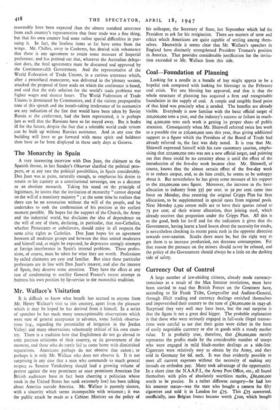Coal—Foundation of Planning
Looking for a needle in a bundle of hay might appear to be a hopeful task compared with looking for blessings in the February coal crisis. Yet one blessing has appeared, and that is that the whole structure of planning has acquired a firm and recognisable foundation in the -supply of coal. A simple and tangible fixed point of that kind was precisely what it needed. The benefits are already -visible. Everybody is now familiar with the basic official target of 200,000,000 tons a year, and the industry's success or failure in reach- ing 4,000,000 tons each week is getting its proper share of public attention. Consequently when Mr. Shinwell referred twice last week to a possible rise to 226,000,000 tons this year, thus giving additional support to a figure which the President of the Board of Trade had already referred to, the fact was duly noted. It is true that Mr. Shinwell expressed himself with his now customary caution, empha- sising that 220,000,000 tons was not a new official target, and pointing out that there could be no certainty about it until the effect of the introduction of the five-day week became clear. Mr. Shinwell, of course, knows that the almost certain effect of the five-day week is to reduce output, and, to .do him credit, he seems to be unhappy about it. But nevertheless he has given some measure of his support to the 220,000,000 tons figure. Moreover, the increase in the basic allocation to industry from 33+ per cent. to 5o per cent. came into force on Monday, thus restoring the original Cripps Plan for firm allocations, to be supplemented in special cases from regional pools. Next Monday 2,500 cotton mills are to have their quotas raised to 75 per cent. of their winter allocation, thus joining steel, which already receives that proportion under the Cripps Plan. All this is to the good, both for itself and for the indication it gives that the Government, having learnt a hard lesson about the necessity for stocks, is nevertheless checking its recent panic rush in the opposite direction towards over-caution. Stocks there must be, but the right way to get them is to increase productioii, not decrease consumption. Foy: that reason the pressure on the miners should never be relaxed, and the policy of the Government should always be a little on the dashing side of safety.


































 Previous page
Previous page